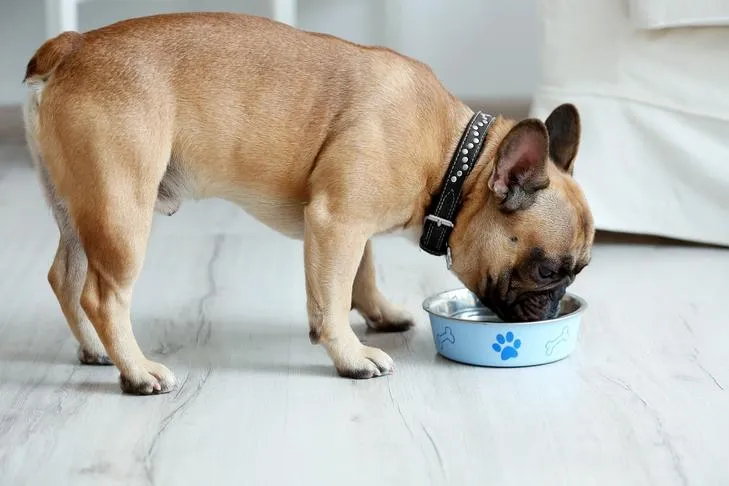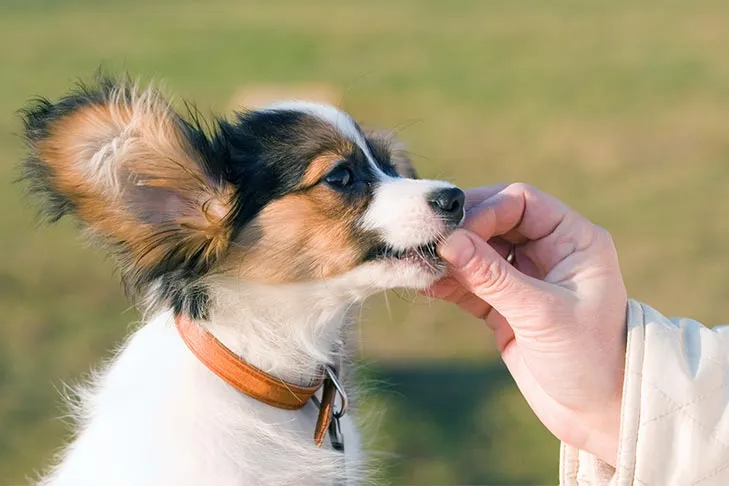As loving dog owners, we often find ourselves tempted to share our meals with our furry companions. While many human foods are off-limits or even toxic to dogs, a surprising number can be safely enjoyed by our canine friends, often providing beneficial nutrients. Understanding what human foods dogs can eat safely, along with proper preparation and portion control, is crucial for maintaining their health and well-being. This guide from Dog Care Story will help you navigate the world of shared snacks, ensuring your dog gets only the best and safest treats from your table.
It’s important to remember that a dog’s primary diet should always come from high-quality commercial dog food that is nutritionally complete and balanced. Human foods should only be given as occasional treats and in moderation. Always introduce new foods slowly and observe your dog for any adverse reactions, such as digestive upset. When in doubt, it’s always best to consult your veterinarian before adding new human foods to your dog’s diet. For dogs that are reluctant to eat their regular food, understanding what can i give my dog to make her eat can also be helpful, but always with caution and professional guidance.
Understanding Safe Human Foods for Dogs
Sharing food with your dog can be a wonderful bonding experience, but it requires careful consideration. The key is to know which foods offer nutritional benefits without posing health risks, and to prepare them appropriately. Always ensure foods are plain, unseasoned, and cooked where necessary. Avoiding excessive fats, sugars, and salts is paramount to prevent digestive issues or long-term health problems for your beloved pet.
Safe and Nutritious Human Foods for Your Canine Companion
There’s a wide variety of common household ingredients that can safely become a delightful and healthy addition to your dog’s treat repertoire. From grains to proteins and even some dairy, these options can boost their nutrient intake while keeping their tails wagging.
Bread: A Simple Treat in Moderation
Plain bread, given in small amounts, is generally safe for dogs, provided it contains no spices, particularly garlic or onion, and absolutely no raisins, which are highly toxic. While bread offers no significant nutritional benefits for dogs, it’s not inherently harmful. Homemade breads are often a better choice than store-bought varieties, as they typically lack the preservatives found in commercial products. However, due to its low nutritional value and high carbohydrate content, bread should be an occasional treat rather than a regular part of their diet.
Cashews: A Healthy Snack (Unsalted Only)
Cashews can be a fine treat for dogs, but only in very limited quantities. These nuts are a source of beneficial nutrients like calcium, magnesium, antioxidants, and protein. However, while cashews have less fat than some other nuts, consuming too many can still contribute to weight gain and potentially lead to pancreatitis due to their fat content. Always offer cashews unsalted, as too much sodium is detrimental to canine health.
Cheese: A Delicious Indulgence (Watch for Lactose)
Most dogs can enjoy cheese in small to moderate amounts as a high-value treat. While lactose intolerance is rare in dogs, it is possible, so monitor your dog for any signs of digestive upset after they consume cheese. Many types of cheese can be high in fat, so opting for lower-fat varieties like cottage cheese or mozzarella is a healthier choice. Some dogs also love dog-specific Himalayan dog chews, which are made from dried cheese and offer a long-lasting, safe chewing experience. Knowing what foods to avoid is just as important as knowing what’s safe; for a comprehensive list of items your dog should never eat, refer to what not to feed dogs list.
 An American dog rests its head on a kitchen table, looking intently at a block of cheese.
An American dog rests its head on a kitchen table, looking intently at a block of cheese.
Coconut: Tropical Benefits for Skin and Breath
Coconut, often considered a superfood for humans, offers several benefits for dogs too. This fruit contains lauric acid, known for its ability to help combat bacteria and viruses, potentially boosting your dog’s immune system. It can also aid in improving bad breath and may help alleviate certain skin conditions like hot spots, flea allergies, and general itchy skin. Both coconut milk and coconut oil are safe for dogs. However, always ensure you remove the fibrous outer shell, as it can be a choking hazard or cause intestinal obstruction if ingested.
Corn: A Common Ingredient, Off the Cob Please!
Corn is a staple ingredient in many commercial dog foods, recognized for providing carbohydrates, fiber, and some antioxidants. It is safe for dogs to eat, especially when cooked and removed from the cob. The cob itself, however, can be extremely dangerous. It is difficult for dogs to digest and can lead to severe intestinal blockages requiring emergency veterinary intervention. Therefore, if you’re sharing corn, always ensure it is off the cob and in moderation.
Eggs: A Protein Powerhouse When Cooked
Fully cooked eggs are an excellent and highly digestible source of protein for dogs. They are rich in vitamins, minerals, and amino acids, making them a nutritious addition to your dog’s diet. Cooked eggs can also be particularly helpful for dogs with an upset stomach, offering a bland yet nourishing meal. It’s crucial to cook eggs thoroughly, as raw egg whites contain avidin, an enzyme that can interfere with biotin absorption, potentially leading to biotin deficiency over time. When your puppy has an upset stomach, choosing appropriate, bland foods can be tricky; learn more about what food to give puppy with upset stomach to ensure their comfort and recovery.
Fish: Omega-Rich Goodness (Cooked and Boneless)
Fish, particularly salmon and sardines, provides a wealth of good fats and amino acids, contributing significantly to your dog’s overall health. Salmon is packed with omega-3 fatty acids, vitamins, and protein, supporting joint health, brain function, and a strong immune system. Sardines are beneficial not only for their omega-3 content but also because their soft, digestible bones offer an extra boost of calcium. With the exception of sardines, it is imperative to meticulously remove all tiny bones from any fish you feed your dog, as they can pose a choking hazard or cause internal injury. Never feed your dog uncooked or undercooked fish due to the risk of parasites; only serve fully cooked and cooled fish, and limit its intake to no more than twice a week.
Ham: A Salty Treat to Be Given Sparingly
While small, plain pieces of ham are generally safe for dogs, it is by no means the healthiest option. Ham is typically high in both sodium and fat, which can lead to digestive upset, excessive thirst, and, in larger quantities, more serious issues like pancreatitis. Therefore, sharing a tiny piece of unseasoned, cooked ham as a rare treat is acceptable, but it should never become a regular habit due to its unhealthy profile. Always avoid ham with glazes, spices, or bones.
 A French Bulldog enjoys eating from a bowl placed on the floor at home.
A French Bulldog enjoys eating from a bowl placed on the floor at home.
Honey: Nature’s Sweet Allergy Reliever
Honey is a natural powerhouse of nutrients, including vitamin A, potassium, calcium, magnesium, copper, and powerful antioxidants. Feeding your dog small amounts of local, raw honey can potentially help with seasonal allergies. This theory suggests that introducing small amounts of local pollen to their system can help build immunity to environmental allergens. Beyond consumption, honey’s natural antibacterial properties also make it a safe and effective topical treatment for minor burns and superficial cuts on your dog’s skin.
Milk: Proceed with Caution for Lactose Intolerance
Dogs can technically have milk, but owners should proceed with caution. While some dogs can digest milk without issues, many are lactose intolerant, meaning their bodies lack the enzyme needed to break down lactose, the sugar in milk. This can lead to digestive upset, including diarrhea, vomiting, and gas. If you offer a small amount of milk, observe your dog closely for any signs of intolerance. For most dogs, water remains the best and safest hydrating option.
Peanut Butter: A Beloved Treat (Xylitol-Free is Key!)
Peanut butter is a highly popular and often excellent source of protein, heart-healthy fats, vitamins B and E, and niacin for dogs. Raw, unsalted, and unsweetened peanut butter is the healthiest choice. However, it is absolutely critical to read the label carefully and ensure the peanut butter does not contain xylitol. Xylitol is a sugar substitute found in many “sugar-free” products, and it is highly toxic to dogs, capable of causing a rapid drop in blood sugar, liver failure, and even death. Always double-check for this dangerous ingredient. For dog owners dealing with undesirable habits, learning what can i give my dog to stop eating poop might offer some practical solutions.
Peanuts: Healthy Fats in Moderation
Unlike almonds, which are not recommended for dogs, plain peanuts are generally safe for canine consumption. They are packed with beneficial fats and proteins that can contribute to your dog’s health. However, like cashews, peanuts should be given in moderation due to their high fat content, which, if consumed excessively, can lead to pancreatic issues. It’s also important to avoid salted peanuts, as too much sodium can be difficult for a dog’s kidneys to process and can lead to health problems.
Popcorn: A Light, Air-Popped Snack
Unsalted, unbuttered, and air-popped popcorn can be an acceptable snack for your dog in moderation. It contains riboflavin and thiamine, which contribute to healthy eyesight and digestion, along with small amounts of iron and protein. When preparing popcorn for your dog, ensure all kernels are fully popped, as unpopped kernels can pose a choking hazard or become lodged in their teeth or digestive tract. Avoid any added seasonings, artificial flavors, or excessive oil.
Pork: A Digestible Protein Source
Pork is a highly digestible protein source, rich in essential amino acids, making it a good option for many dogs. Compared to some other meats, it may even be less likely to cause an allergic reaction in sensitive pets. However, pork generally contains more calories per pound than leaner meats like chicken or turkey, so it should be offered in moderation, especially for dogs prone to weight gain. Always ensure pork is thoroughly cooked and unseasoned, with all bones and excess fat removed.
 A fluffy Samoyed puppy lays comfortably in the green grass outdoors.
A fluffy Samoyed puppy lays comfortably in the green grass outdoors.
Quinoa: A Healthy Grain Alternative
Quinoa, a complete protein, has gained popularity in human diets and is now often found in high-quality dry dog foods. Its robust nutritional profile makes it an excellent, healthy alternative to more common starches like corn, wheat, and soy, which are frequently used as fillers in kibble. Quinoa provides essential amino acids, fiber, and various minerals, contributing to a balanced and healthy diet for dogs.
Salmon: A Brain and Immune Booster (Always Cooked)
Fully cooked salmon is an outstanding source of protein, healthy fats, and amino acids, offering significant benefits for your dog’s joint health, brain function, and overall immune system. The omega-3 fatty acids in salmon are particularly beneficial for coat health and reducing inflammation. However, raw or undercooked salmon contains parasites that can cause Salmon Poisoning Disease in dogs, leading to severe symptoms such as vomiting, diarrhea, dehydration, and in extreme cases, even death. It is absolutely crucial to cook salmon all the way through to eliminate these dangerous parasites. When considering what meat is dangerous for dogs, raw salmon is definitely high on the list.
Shrimp: Low-Fat, Antioxidant-Rich Bites
A few cooked shrimp can be a delightful and healthy treat for your dog. Shrimp are low in fat, calories, and carbohydrates, while being rich in antioxidants, vitamin B-12, and phosphorus. These nutrients support various bodily functions, from energy metabolism to bone health. It is essential that shrimp are fully cooked and that the entire shell, including the tail, head, and legs, is completely removed before offering them to your dog, as shells can be a choking hazard or difficult to digest.
Tuna: Omega-3 Benefits in Small Doses
Dogs can enjoy tuna, but only in very small amounts and prepared correctly. Cooked, fresh tuna is an excellent source of omega-3 fatty acids, which are highly beneficial for promoting heart and eye health. When it comes to canned tuna, moderation is key due to its potential mercury content and often high sodium levels. If offering canned tuna, choose varieties packed in water (not oil) and ensure it contains no added spices, such as onion or garlic, which are toxic to dogs. A tiny bit of plain, water-packed canned tuna and its juice can be an occasional treat.
Turkey: Lean Protein with Precautions
Cooked turkey is generally safe for dogs and serves as a lean source of protein. When preparing turkey for your dog, always ensure you remove any excess fat, skin, and especially bones. Poultry bones can splinter easily when chewed and ingested, posing serious risks of choking, internal blockages, or even tears in the intestines. Furthermore, avoid feeding your dog any turkey that has been seasoned with excessive salt, spices, onions, or garlic, as these can be toxic or cause severe digestive upset.
Wheat or Grains: Not Always the Enemy
The notion that dogs need to be grain-free is often a misconception. In fact, healthy grains like wheat, corn, and oats are excellent sources of protein, essential fatty acids, and fiber, contributing significantly to a dog’s overall nutrition. Unless your dog has a diagnosed grain allergy, there is typically no need to avoid grains. If you suspect your dog has specific food allergies or sensitivities, it is always best to consult your veterinarian for personalized dietary recommendations.
Yogurt: Probiotic Goodness (Plain and Unsweetened)
Plain yogurt can be a perfectly acceptable and beneficial snack for dogs. The active bacteria cultures found in plain yogurt can act as probiotics, helping to strengthen and support a healthy digestive system. However, as with milk, some dogs may have trouble digesting dairy products and could experience mild lactose intolerance symptoms. Always opt for plain, unsweetened yogurt, and absolutely avoid any yogurts containing artificial sweeteners, especially xylitol, which is highly toxic to dogs.
 A Papillon puppy gently takes a small treat from a human hand.
A Papillon puppy gently takes a small treat from a human hand.
Human Foods Dogs Can’t Eat
While this guide focuses on safe human foods, it is equally, if not more, important to be aware of the many people foods that are dangerous or even toxic for dogs. Foods like chocolate, grapes, raisins, onions, garlic, avocado, macadamia nuts, and anything containing xylitol can cause serious illness, organ damage, or even be fatal. Always keep these foods out of your dog’s reach. If you suspect your dog has ingested something toxic, contact your veterinarian or an emergency animal hospital immediately.
Conclusion: Feeding Your Dog Safely and Responsibly
Navigating the world of human foods for dogs can seem daunting, but by understanding which items are safe and following simple guidelines, you can responsibly share healthy treats with your canine companion. Remember that moderation, proper preparation, and avoiding harmful ingredients are key. Always prioritize your dog’s health by ensuring their main diet is complete and balanced, using human foods only as supplemental treats. When in doubt about any food, consult your veterinarian to make the best, safest choices for your beloved pet. Continue exploring Dog Care Story for more expert advice on canine health and nutrition!
